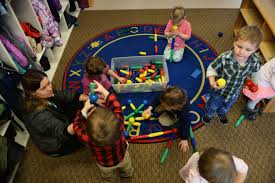My Journey in Childcare
My journey in Childcare began back in 2015, when I was accepted onto a Fetac Level 5 Early Childhood Care and Education course with the local ETB. I got into childcare as a teenager, by volunteering at local Summer Camps, and by of course, as most of us do, babysitting. So pursuing an education in Childcare seemed like the natural and logical next step.
Eventually after a year of studying, I obtained my Fetac Level 5 Certificate in Early Childhood Care & Education. Unfortunately, the local ETB was not offering a Level 6 in Childcare, but this ultimately lead me to Chevron Training. After some in-depth investigation into online courses, I decided to enrol on their QQI Level 6 in Early Childhood Care & Education.
Obtaining this Level 6 in Childcare is what lead me to gaining employment with a local, award winning Crèche/Montessori. I personally found that completing my Level 6 with Chevron was very user friendly and accessible. If I am being honest, I found the course content to be far superior to that of the Level 5 I had completed before. The course notes were extremely in-depth, yet easy to understand, and it was very clear that the tutors knew their stuff. My tutor always had an answer for the (many) questions I had, and they always got back to me quickly and efficiently. Their feedback was easy to take on board, and in the end helped me become more confident in my assignments.
What made Chevron Training stand out for me was the range of elective modules that are offered. When completing my Level 5 Childcare, we were not given any option on what elective modules we wanted to complete, whereas with Chevron, you have a lot of choice that will suit all different types of learners. Modules such as Disability Awareness and Special Needs Assisting cater towards childcare workers who have an interest in working with children with additional or special needs. Whereas the Arts & Culture and Literacy & Numeracy Modules suit the needs of the more artistically inclined childcare worker. Every early years setting needs staff who can offer both sides of the spectrum of childcare, in order to provide quality care to each child. Chevron Training is helping to pave the way for each childcare worker to obtain these skills, which in turn is only going to improve childcare in Ireland, now and in the future.

From my own experience, the most rewarding modules in Level 6 Childcare are Child Development and Child Psychology. These modules are fundamental, I believe to anybody working in childcare. It is not always abundantly clear in day-to-day life that the topics covered in these modules, are the reasoning behind much of a child’s actions and emotions. Anybody working in childcare will know that Observations are hugely important. They help you to form a deep understanding of each child, so you can then go on to develop the best care and curriculum that suits each individual child, as not every child learns and thinks the same. Child Development and Child Psychology really help you to understand the goings on of each child’s development, and that in turn helps you to give every observation a sturdy foundation.
When I was working in the Early Years Setting, I was a Pre-School teacher. Many people do not realise that the pre-school room is more than what it seems to be. When you work in a pre-school room, you are helping to set up children for not only the beginning of School, but also for their lives. While working in conjunction with the parents, you are helping to mould their children into becoming confident and self-sufficient young people. This starts by beginning their formal education in a way that is tailor made for them. This is where the Early Childhood Curriculum module comes into play. This module is all about how to execute each curriculum, and how to plan each curriculum. We taught the children by planning a curriculum for each week of the month. These curriculums could be seasonal, for example, all about Christmas, but they could also be about the Children’s interest, this is called Emerging Curriculum, and it is a very successful way in educating children, as you are educating them about their interests. When it came time to carry out my first Curriculum Plan, I had no need to worry, as the Early Childhood Curriculum Module had me set up. I understood the best way to plan a curriculum, I understood how to incorporate themes from both Aistear and Siolta, and I understood how to write out the report at the end of the curriculum. As this was my first job in childcare, I was delighted that I knew how to do exactly what was asked of me, all thanks to this vitally important module offered by Chevron Training.

The last aspect of this Level 6 I am going to talk about, is the benefits of the ongoing work placement. Work placement is required for each module, and is hugely beneficial. The experience you get out of work placement, and the knowledge imparted on you from the childcare workers, really help you with your assignments, and also help you become more confident in your abilities. Even just observing the interactions between children, and between the staff and children, are great to see, as you can use this experience to add a personal touch to your assignments. You also have to carry out Skills Demonstrations, such as reading a story to a group of kids during circle time. Something like this can seem daunting at first, but after witnessing it many times during work placement, you understand that it’s not daunting, it’s actually great fun, and the children love it. Situations like this help you become confident and really back you up when it comes to searching for employment in the future.
Studying Childcare, and working in Childcare were brilliant experiences for me, and I owe a lot of what I know now to this. I wouldn’t have had the opportunity to work in this field without obtaining my Level 6 in Childcare with Chevron Training. This has also really given me the push to go on and start my BA (Hons) Degree in Early Childhood Studies with Chevron Training and The University of East London this September.





 We fill in our care plans before lunch begins. Any changes in the residents condition is reported to the nurse at the earliest possible time. Most residents have lunch in the dining room. Having ensured everyone is in the dining room we begin serving lunch. Some days you serve and some you assist with feeds. After lunch the residents are assisted with toileting. Many of them require incontinence care. Most days there are activities organised for the residents. Tea is much the same as lunch. The evening passes assisting residents to bed. Some like to watch television or sit in the day room whilst others like to go to bed early.
We fill in our care plans before lunch begins. Any changes in the residents condition is reported to the nurse at the earliest possible time. Most residents have lunch in the dining room. Having ensured everyone is in the dining room we begin serving lunch. Some days you serve and some you assist with feeds. After lunch the residents are assisted with toileting. Many of them require incontinence care. Most days there are activities organised for the residents. Tea is much the same as lunch. The evening passes assisting residents to bed. Some like to watch television or sit in the day room whilst others like to go to bed early.